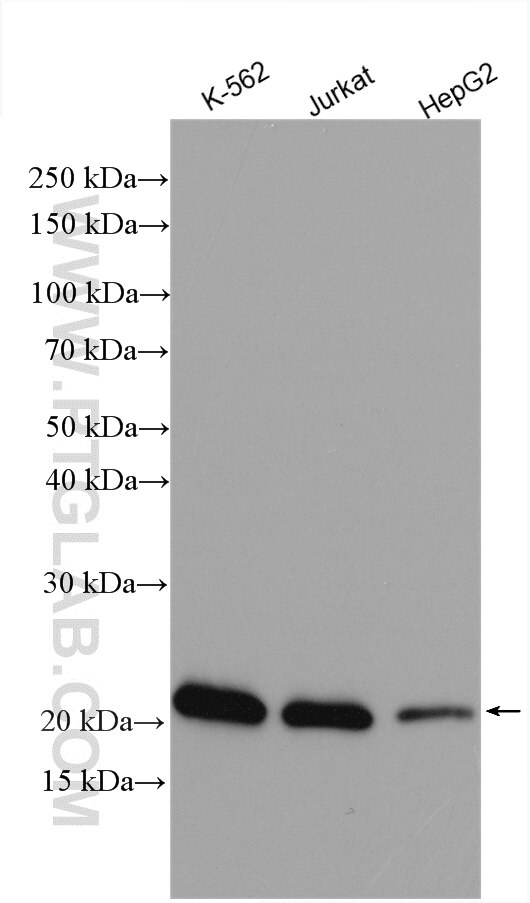C6orf108 Polyklonaler Antikörper
C6orf108 Polyklonal Antikörper für WB, ELISA
Wirt / Isotyp
Kaninchen / IgG
Getestete Reaktivität
human
Anwendung
WB, ELISA
Konjugation
Unkonjugiert
Kat-Nr. : 25596-1-AP
Synonyme
Galerie der Validierungsdaten
Geprüfte Anwendungen
| Erfolgreiche Detektion in WB | K-562-Zellen, HepG2-Zellen, Jurkat-Zellen |
Empfohlene Verdünnung
| Anwendung | Verdünnung |
|---|---|
| Western Blot (WB) | WB : 1:5000-1:50000 |
| It is recommended that this reagent should be titrated in each testing system to obtain optimal results. | |
| Sample-dependent, check data in validation data gallery | |
Produktinformation
25596-1-AP bindet in WB, ELISA C6orf108 und zeigt Reaktivität mit human
| Getestete Reaktivität | human |
| Wirt / Isotyp | Kaninchen / IgG |
| Klonalität | Polyklonal |
| Typ | Antikörper |
| Immunogen | C6orf108 fusion protein Ag22336 |
| Vollständiger Name | chromosome 6 open reading frame 108 |
| Berechnetes Molekulargewicht | 174 aa, 19 kDa |
| Beobachtetes Molekulargewicht | 23 kDa |
| GenBank-Zugangsnummer | BC011683 |
| Gene symbol | C6orf108 |
| Gene ID (NCBI) | 10591 |
| Konjugation | Unkonjugiert |
| Form | Liquid |
| Reinigungsmethode | Antigen-Affinitätsreinigung |
| Lagerungspuffer | PBS mit 0.02% Natriumazid und 50% Glycerin pH 7.3. |
| Lagerungsbedingungen | Bei -20°C lagern. Nach dem Versand ein Jahr lang stabil Aliquotieren ist bei -20oC Lagerung nicht notwendig. 20ul Größen enthalten 0,1% BSA. |
Hintergrundinformationen
C6orf108 also named as DNPH1, catalyzes the cleavage of the N-glycosidic bond of deoxyribonucleoside 5'-monophosphates to yield deoxyribose 5-phosphate and a purine or pyrimidine base. Deoxyribonucleoside 5'-monophosphates containing purine bases are preferred to those containing pyrimidine bases (PMID: 24260472). Expressed at low levels in brain, colon, lung, peripheral blood leukocytes, placenta, small intestine, and thymus. Expressed at high levels in heart, kidney, liver, skeletal muscle and spleen. Overexpressed in a significant proportion of breast cancers (PMID: 18726892).
Protokolle
| Produktspezifische Protokolle | |
|---|---|
| WB protocol for C6orf108 antibody 25596-1-AP | Protokoll herunterladen |
| Standard-Protokolle | |
|---|---|
| Klicken Sie hier, um unsere Standardprotokolle anzuzeigen |


